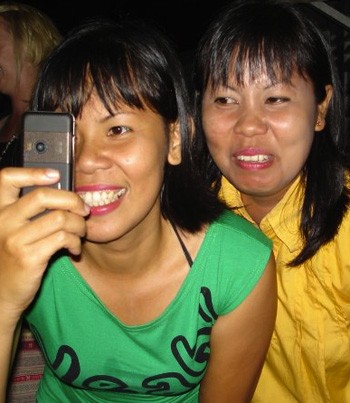Nikki Edwards
Mixed reactions as women document a community development initiative in Bangka BelitungNikki Edwards |
This special edition of Inside Indonesia presents a variety of views on the extent to which gender-focused initiatives have improved or otherwise changed the day-to-day lives of Indonesian women. A number of the articles focus on the gap between those women who have benefited from development and those who are left behind. Some question the rationale underpinning particular development programs or the true effect of gender-focused government initiatives on women. Others focus on the marginalised women who benefit from development initiatives and consider the ways in which this is occurring.
Rosser sets the scene, writing about how government schemes which provide maternal healthcare to low-income women fail to provide an adequate level of support. He contends that these schemes cannot be fixed with more funding alone, but that they must also concentrate on empowering the mothers they aim to help. In the second article, Ford argues that although labour force participation is improving for women in Indonesia, the effect is not empowering for women across the board, leaving working-class women to shoulder much of the burden of development.
Shifting the focus to consider the effect of development programs more specifically, Elmhirst contends that many gender-focused environmental initiatives fail to address the fundamental unsustainability of exploitative economic development. She argues that while programs which focus on individualising environmental responsibility are problematic for this reason, there is hope in the form of emerging alliances between environmental NGOs and peasants unions, which are now starting to promote the values of ecofeminism.
Also shining a spotlight on development programs, Idrus is critical of ‘gender mainstreaming’ initiatives which set up special programs for women. She argues that all too often the Indonesian government conflates ‘gender equity’ and ‘women’s empowerment’, with the result that gender concerns are isolated from mainstream development practice. Continuing this close focus on the Indonesian government, Suryakusuma argues that the concept of ‘state ibuism’ – a term she coined over two decades ago – still holds relevance in contemporary Indonesia. She writes that although the role of the state has changed, women are still being constructed to fit into a patriarchal order, which now takes the form of a new state sanctioned version of Islam that is increasingly intruding in women’s lives.
The final two articles offer a more up-beat message. Morton’s article about women’s savings schemes in Sulawesi indicates that these kinds of initiatives can improve the situation for at least some women. She explains that by enabling low-income women to borrow very small amounts of money these schemes not only help improve quality of life but also empower participants. Similarly, Nawilis writes about how an alliance between two NGOs in Nusa Tenggara that is helping to empower female heads of households and promote sustainable technology at the same time. This is another example of the kind of small scale initiative that does not register in development indicators but nevertheless is having a positive effect on the lives of the women it assists.
But while positives steps are being made towards gender-focused development and women’s empowerment, there is still a long way to go. As several authors point out, genuinely meeting the needs of women within developing Indonesia is going to depend on more than simply continuing current programs. The concerns raised in articles in this edition offer a starting point for the creation of a reworked development agenda that builds on the lessons of the past in an attempt to achieve genuine gender equity in the future.
Nikki Edwards (nedw8099@uni.sydney.edu.au) completed Honours in Indonesian Studies at the University of Sydney and is now a Juris Doctor candidate at the University of New South Wales.



